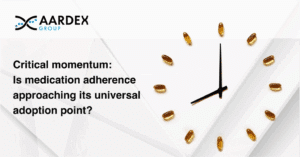Decentralized Clinical Trials (DCTs) are here to stay, as demonstrated by international regulators’ recent commitments to the model.
But while the approach offers a multitude of benefits, from expanding access to increasing cohort diversity, it can also serve to magnify existing protocol deviations such as poor adherence to the dosing regimen.
If we are to get the most out of Decentralized Clinical Trials, we need to understand the pitfalls as well as the potential and adapt our workflows accordingly.
Challenges and Opportunities
The benefits of Decentralized Clinical Trials have been well documented in recent years. The FDA’s Digital Health Technologies for Remote Data Acquisition in Clinical Investigations Guidance for Industry, Investigators, and Other Stakeholders, for example, says that technological advances have “revolutionized the ability to remotely obtain and analyze clinically relevant information”.1
The guideline, published in January, said that using Digital Health Technologies (DHT) for direct, frequent data collection in a home environment provides a broader picture of people’s daily lives and behaviors. In addition, technological solutions can capture information from those who might otherwise be unable to report their experiences, such as infants or people living with cognitive impairment, it said.
In Europe, the Accelerating Clinical Trials in the EU (ACT EU) initiative, part of the updated EU clinical trial regulation, has also placed the spotlight on this new way of working.2
Launched by the European Commission, the Heads of Medicines Agencies, and the European Medicines Agency in January, the program lists enabling innovative trial methods and supporting the modernization of good clinical practice as being among its 10 “priority actions” for the coming year.
Documents such as these are installing confidence in remote monitoring and giving the industry the framework it needs to embrace the potential of DCTs or at least a hybrid trial.
Decentralized Clinical Trials and Medication Adherence
As we move into this new world, however, we must be cognizant of the pitfalls as well as the benefits of Decentralized Clinical Trials. Adherence to medication, long an issue in clinical trials, is one potential casualty.
Sponsors and CROs know that patients not taking their medication as prescribed can drain study power, even to the point of study failure, and lead to underestimations of drug efficacy. They know this because poor adherence to medication is already common.3
But they also need to be aware that Decentralized Clinical Trials can magnify the problem. By removing at least some of the face-to-face contact between site and participant can impact the person’s engagement with the trial protocol – a well-documented factor in poor medicine-taking behavior.4,5
Secondly, the fact that Decentralized Clinical Trials facilitate a more diversified population may actually reduce the number of adherent patients recruited. Currently, study teams have a selection bias towards those patients they know to be disciplined in their medication-taking behavior. However, by facilitating broader inclusion, Decentralized Clinical Trials can serve to remove this site filter and compound issues surrounding poor adherence to medication.
Successful adherence to management procedures, then, is extremely important to the successful implementation of DCTs.
In recent years, a variety of Digital Health Technologies (DHTs) that purport to solve the problem of adherence has emerged. Many of these, however, such as solutions that ask people to record every medication intake in an e-diary or submit videos of themselves taking their medicine, is counterintuitive. They can place an additional burden on the patient – the very thing remote data monitoring is attempting to avoid.6,7
The best solutions are frictionless, in that they tear down rather than erect barriers to adherence. By combining the power of smart packaging and data analytics /visualizations, sponsors and CROs ask nothing more of participants than to take their medication.
Connected blister packs, smart bottles, or pre-filled syringes, for example, can collect the time and date of dose, and transmit it to a cloud-based platform. Algorithms conduct a sophisticated analysis of medication-taking behaviors and present the site staff with powerful visualizations. This enables them to spot patterns that might indicate “at-risk” participants, allowing for risk stratification and informing individualized interventions.
The approach can even be integrated into third-party applications, such as patient-facing mobile phone apps, which are designed to continually encourage adherence, and reinforce engagement with the protocol.
Digital adherence monitoring, then, gives site teams the ability to get to know participants, even when not meeting in person, thereby maintaining the human connection of face-to-face trials.
Case Studies
AARDEX has been working with sponsors and CROs to embed our evidence-based adherence solutions into clinical trials for some time. What we have found is that there is no one size fits all solution.
The right service or combination of services will depend on a variety of factors. It means that the best adherence management partner is one that can offer an ecosystem of solutions that can be matched to the needs of the trial and its cohort.
In February, for example, our teams started working with Trials@Home, a center for excellence for remote DCTs, on a phase III study. It will include participants with diabetes Type 2 across more than 60 sites in several countries. Of those, some will be a site-based, hybrid, and others will be in the remote arm.
A smart monitoring solution will collect dosing data from Sanofi’s insulin pens, and send it via Bluetooth, to AARDEX’s MEMS® Adherence Software for analysis.
The study, due to end in August 2024, aims to provide an optimal understanding of patient behaviors. The insights could help improve medication adherence in a patient cohort where non-adherence has a direct causal association with hospitalization and mortality.
In Australia, the University of Sydney and the University of New South Wales took a different approach when they used AARDEX’s digital solutions to verify adherence during a clinical research project.
The study, to determine whether the self-monitoring of serum uric acid concentrations improved adherence to the urate-lowering drug allopurinol among people with gout, enrolled participants for one-year follow-up.
They chose AARDEX’s MEMS® Cap, a customizable smart pill bottle cap, and MEMS® Mobile for Research app, which participants downloaded to their own phones in a Bring Your Own Device (BYOD) model that kept costs to a minimum.
Participants used the app to access their time-stamped dosing events from the smart package and transmit the data to the MEMS AS® software. This allowed the team to collect and review dosing information in real-time to spot erratic dosing patterns and provide additional support when needed.
Patients were also able to send comments to the study team via the app, which staff said had helped to increase engagement
The New Normal
Decentralized Clinical Trials are fast becoming the new normal, as they offer huge benefits for more streamlined, patient-centered trials. But if we are to fully embrace the advantages, we must be aware of the pitfalls as well as the potential.
Remote data monitoring can magnify the issue of poor medication adherence as it risks eroding the relationships that can keep people engaged in the protocol.
However, when tailored to the needs of the trial and the cohort, digital adherence monitoring wraps its arms around participants. And in doing so it provides a frictionless solution that informs targeted interventions and re-establishes the all-important connection between site and patient.
References:
- Digital Health Technologies for Remote Data Acquisition in Clinical Investigations. 2022. Available at: https://www.fda.gov/regulatory-information/search-fda-guidance-documents/digital-health-technologies-remote-data-acquisition-clinical-investigations Last accessed: 23rd March 2022.
- Accelerating Clinical Trials in the EU (ACT EU) Delivering an EU clinical trials transformation initiative. 2022. Available at: https://www.ema.europa.eu/en/documents/regulatory-procedural-guideline/accelerating-clinical-trials-eu-act-eu-delivering-eu-clinical-trials-transformation-initiative_en.pdf Last accessed: 23rd March 2022.
- Vrijens B, Urquhart J. Methods for measuring, enhancing, and accounting for medication adherence in clinical trials. Clin Pharmacol Ther. 2014 Jun;95(6):617-26. doi: 10.1038/clpt.2014.59. Epub 2014 Mar 12. PMID: 24739446.
- Balkrishnan R, Kulkarni AS, Cayce K, Feldman SR. Predictors of healthcare outcomes and costs related to medication use in patients with acne in the United States. Cutis. 2006 Apr;77(4):251-5. PMID: 16706243.
- Muddasani S, Heron CE, Fleischer AB Jr, Feldman SR. Time Intervals Until the First Return Office Visit After New Medications. J Drugs Dermatol. 2020 Dec 1;19(12):1226-1230. doi: 10.36849/JDD.2020.5542. PMID: 33346517.



